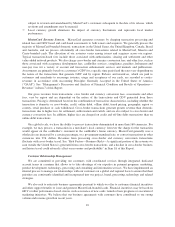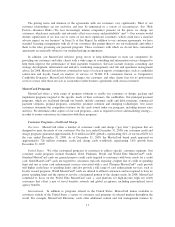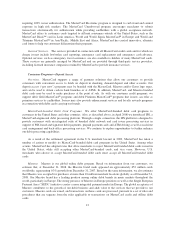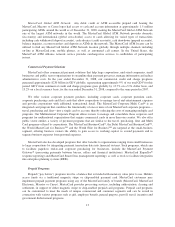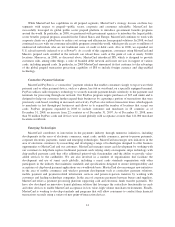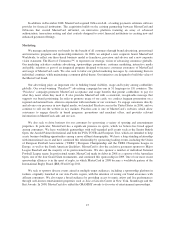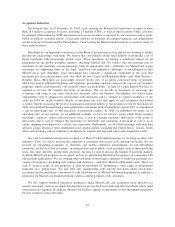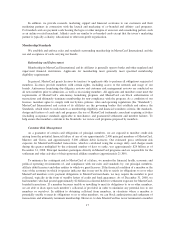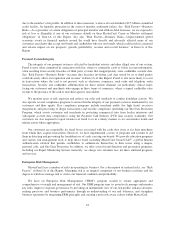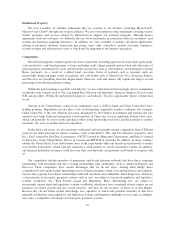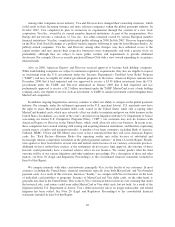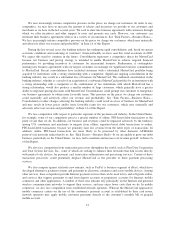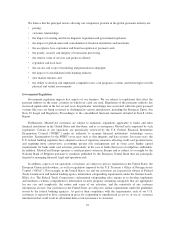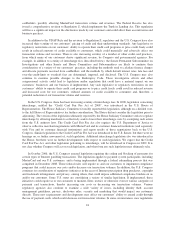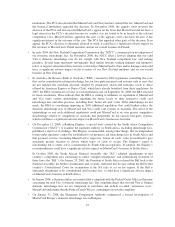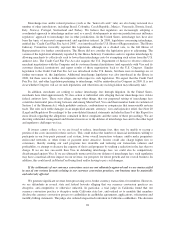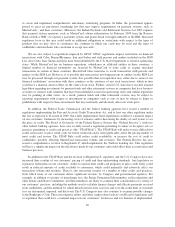MasterCard 2008 Annual Report Download - page 30
Download and view the complete annual report
Please find page 30 of the 2008 MasterCard annual report below. You can navigate through the pages in the report by either clicking on the pages listed below, or by using the keyword search tool below to find specific information within the annual report.Among other companies in our industry, Visa and Discover have changed their ownership structures, which
could result in their becoming stronger and more efficient companies within the global payments industry. In
October 2007, Visa completed its plan to restructure its organization through the creation of a new stock
corporation, Visa Inc., owned by its current member financial institutions. As part of the reorganization, Visa
Europe did not become a subsidiary of Visa Inc., but rather remained owned by various European member
financial institutions. Visa Inc. completed its initial public offering in 2008. In July 2007, Discover began trading
on the New York Stock Exchange as a publicly-traded company following its spin-off from Morgan Stanley. As
publicly-owned companies, Visa Inc. and Discover, among other changes, may have enhanced access to the
capital markets and may operate their respective businesses more transparently and with a greater focus on
profitability, although they are subject to more public scrutiny and requirements to provide additional
disclosures. For example, Discover recently purchased Diners Club with a view toward expanding its acceptance
internationally.
Also, in 2008, American Express and Discover received approval to become bank holding companies.
While bank holding companies are subject to numerous regulatory requirements, they also are eligible to request
an investment from the U.S. government under the Treasury Department’s Troubled Asset Relief Program
(“TARP”) and may be eligible for similar government programs in the future. American Express announced in
December 2008 that it had requested and was approved to receive a $3.39 billion investment from the U.S.
government under the TARP, and Discover announced in January 2009 that it had requested and was
preliminarily approved to receive a $1.2 billion investment under the TARP. MasterCard is not a bank holding
company and is not eligible to receive such an investment. A TARP or similar investment could strengthen these
MasterCard competitors.
In addition, ongoing litigation has and may continue to affect our ability to compete in the global payments
industry. For example, under the settlement agreement in the U.S. merchant lawsuit, U.S. merchants now have
the right to reject MasterCard-branded debit cards issued in the United States while still accepting other
MasterCard-branded cards, which may adversely affect our ability to maintain and grow our debit business in the
United States. In addition, as a result of the court’s decision in our litigation with the U.S. Department of Justice
concerning our former U.S. Competitive Programs Policy (“CPP”), our customers may now do business with
American Express or Discover in the United States, which could adversely affect our business. In recent years,
these competitors have started working with issuing and acquiring financial institutions, and therefore replicating
certain aspects of end-to-end payment networks. A number of our large customers, including Bank of America,
Citibank, HSBC, USAA and GE Money now issue or have announced that they will issue American Express
cards. See “Risk Factors—Business Risks—Our operating results may suffer because of substantial and
increasingly intense competition worldwide in the global payments industry” in Item 1A in this Report. Finally,
suits against us have been filed in several state and federal courts because of our currency conversion practices.
Although we have settled these matters, if the settlements do not receive final approval, the outcome of these
lawsuits could potentially have a material adverse effect on our business. We cannot predict what the final
outcome will be of our various litigations and other regulatory proceedings. For a description of these and other
matters, see Note 20 (Legal and Regulatory Proceedings) to the consolidated financial statements included in
Item 8 of this Report.
We compete intensely with other card networks, principally Visa, for the loyalty of our customers. In most
countries, including the United States, financial institutions typically issue both MasterCard- and Visa-branded
payment cards. As a result of this structure, known as “duality,” we compete with Visa for business on the basis
of individual card portfolios or programs. Issuance of MasterCard and Visa debit cards, on the other hand, is
generally non-dual in the United States. This is due to Visa’s historical debit exclusivity rule, meaning that under
the historical rule, card issuers could issue either MasterCard or Visa debit cards, but not both. As a result of the
litigation with the U.S. Department of Justice, Visa’s debit exclusivity rule is no longer enforceable, and related
litigation has been settled. See Note 20 (Legal and Regulatory Proceedings) to the consolidated financial
statements included in item 8 of this Report.
20


